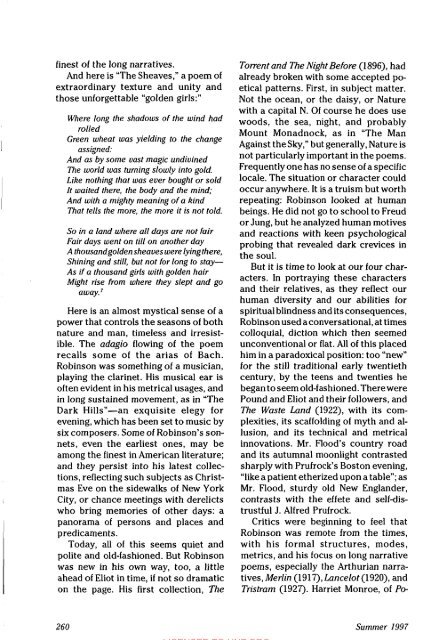Edwin Arlington Robinson: Tilbury Town Revisited
Edwin Arlington Robinson: Tilbury Town Revisited
Edwin Arlington Robinson: Tilbury Town Revisited
Create successful ePaper yourself
Turn your PDF publications into a flip-book with our unique Google optimized e-Paper software.
finest of the long narratives.<br />
And here is “The Sheaves,” a poem of<br />
extraordinary texture and unity and<br />
those unforgettable “golden girls:”<br />
Where long the shadows of the wind had<br />
rolled<br />
Green wheat was yielding to the change<br />
assigned:<br />
And as by some vast magic undivined<br />
The world was turning slowly into gold.<br />
Like nothing that was ever bought or sold<br />
It waited there, the body and the mind;<br />
And with a mighty meaning of a kind<br />
That tells the more, the more it is not told.<br />
So in a land where all days are not fair<br />
Fair days went on till on another day<br />
A thousandgolden sheaves were lying there,<br />
Shining and still, but not for long to stay-<br />
As if a thousand girls with golden hair<br />
Might rise h-om where they slept and go<br />
away.?<br />
Here is an almost mystical sense of a<br />
power that controls the seasons of both<br />
nature and man, timeless and irresist-<br />
ible. The adagio flowing of the poem<br />
recalls some of the arias of Bach.<br />
<strong>Robinson</strong> was something of a musician,<br />
playing the clarinet. His musical ear is<br />
often evident in his metrical usages, and<br />
in long sustained movement, as in “The<br />
Dark Hills”-an exquisite elegy for<br />
evening, which has been set to music by<br />
six composers. Some of <strong>Robinson</strong>’s son-<br />
nets, even the earliest ones, may be<br />
among the finest in American literature;<br />
and they persist into his latest collec-<br />
tions, reflecting such subjects as Christ-<br />
mas Eve on the sidewalks of New York<br />
City, or chance meetings with derelicts<br />
who bring memories of other days: a<br />
panorama of persons and places and<br />
predicaments.<br />
Today, all of this seems quiet and<br />
polite and old-fashioned. But <strong>Robinson</strong><br />
was new in his own way, too, a little<br />
ahead of Eliot in time, if not so dramatic<br />
on the page. His first collection, The<br />
260<br />
Torrent and The Night Before (1896), had<br />
already broken with some accepted po-<br />
etical patterns. First, in subject matter.<br />
Not the ocean, or the daisy, or Nature<br />
with a capital N. Of course he does use<br />
woods, the sea, night, and probably<br />
Mount Monadnock, as in “The Man<br />
Against the Sky,” but generally, Nature is<br />
not particularly important in the poems.<br />
Frequentlyone has no sense of a specific<br />
locale. The situation or character could<br />
occur anywhere. It is a truism but worth<br />
repeating: <strong>Robinson</strong> looked at human<br />
beings. He did not go to school to Freud<br />
or Jung, but he analyzed human motives<br />
and reactions with keen psychological<br />
probing that revealed dark crevices in<br />
the soul.<br />
But it is time to look at our four char-<br />
acters. In portraying these characters<br />
and their relatives, as they reflect our<br />
human diversity and our abilities for<br />
spiritual blindness and its consequences,<br />
<strong>Robinson</strong> used aconversational, at times<br />
colloquial, diction which then seemed<br />
unconventional or flat. All of this placed<br />
him in a paradoxical position: too “new”<br />
for the still traditional early twentieth<br />
century, by the teens and twenties he<br />
began to seem old-fashioned. There were<br />
Pound and Eliot and their followers, and<br />
The Waste Land (1922), with its com-<br />
plexities, its scaffolding of myth and al-<br />
lusion, and its technical and metrical<br />
innovations. Mr. Flood’s country road<br />
and its autumnal moonlight contrasted<br />
sharply with Prufrock’s Boston evening,<br />
“like a patient etherized upon a table”; as<br />
Mr. Flood, sturdy old New Englander,<br />
contrasts with the effete and self-dis-<br />
trustful J. Alfred Prufrock.<br />
Critics were beginning to feel that<br />
<strong>Robinson</strong> was remote from the times,<br />
with his formal structures, modes,<br />
metrics, and his focus on long narrative<br />
poems, especially the Arthurian narra-<br />
tives, Merlin (1917), Lancelot (1920), and<br />
Trish-am (1927). Harriet Monroe, of Po-<br />
Summer 1997
















